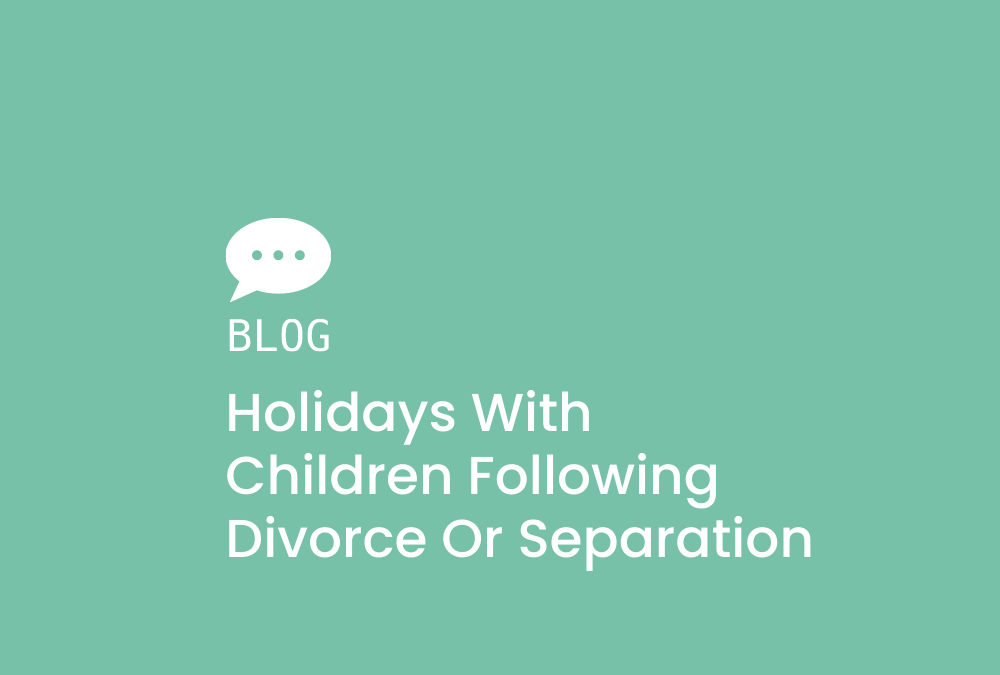Holidays with children following divorce or separation
After what has been one of the toughest years of recent times and the country begins its journey on Boris Johnson’s cautious but irreversible roadmap out of lockdown, many people are ready for a break. Much of the population have booked their summer staycation and many are eager to hear the Government’s proposals on the 17th of May regarding foreign holiday travel, quarantine rules and Covid passports.
But planning a holiday with your children can add further complications if you are divorced or separated from the other parent. There are legal consequences for taking children on holiday without the relevant permission and there are certain factors that you should bear in mind when planning your holidays.
Obtaining your ex’s consent
If you do not have the proper consent in place or the required legal responsibility for your children, taking them out of the country is considered abduction. Unless you have a relevant Child Arrangement Order in place or other appropriate permissions from the Court, you will need to obtain consent from every person who has parental responsibility for the children concerned – even if contact between the children and the other responsible parent is limited or non-existent.
Every person with parental responsibility has a right to know their children’s whereabouts and so should be given at least the basic information about a planned trip i.e. where they’re going, the dates they will be away, travel times and contact numbers for any virtual contact (e.g. Facetime) or emergencies.
If grandparents or other family members wish to take the children on holiday, they will also need to obtain the relevant consents from those with parental responsibility.
Proof of consent
Consent from the other responsible parent should take the form of a signed letter that includes their contact information and details about the trip.
You may also need to prove your own relationship with the children. It would therefore be good practice to have their birth or adoption certificate on hand, as well as a divorce or marriage certificate if your family name is different from that of the children.
Laws concerning travelling with children vary greatly around the world and some countries may require additional documents before you can enter. You can find out the requirements of the country you are travelling to via its UK based embassy.
How can I stop my children from being taken abroad?
If you have concerns about your ex-partner leaving the country with your children, you may apply for a Prohibited Steps Order.
However, such an Order will only be granted in limited circumstances. Permission to go abroad with children is often granted unless there are certain factors complicating the case. For example, the Court may grant a Prohibited Steps Order if it deems the holiday is not genuine; if the destination is considered unreasonable or dangerous; if the holiday is during term-time rather than the school holidays; if there is a possibility the parent may not return the child to this country; or if the parents themselves have threatened not to return.
The primary concern of the Court will always be the welfare of the children.
Getting permission from the Court
If the responsible parents cannot agree consent for travel, the parent wanting to take the children on holiday can apply to the Court for a Specific Issue Order. This will involve informing the Court about various aspects of the trip including why you have decided to go; who you are going with; the dates you will be away; your travel and accommodation arrangements; and the contact details of the other responsible parent.
Choosing your holiday destination: The Hague Convention
Where an application is made to the Court, one of the major concerns is that the children may not be brought back to the UK. If the parent travelling with the children can demonstrate that they have taken reasonable steps to guarantee the return of the child, then they are likely to be granted the relevant consent.
The Hague Convention is the international legislation governing child abduction laws. It is designed to ensure that children wrongfully removed from a member country are returned as soon as possible.
However, not all countries are signatories to the Convention and so different destinations will present different levels of risk to the Court. For example, taking your children to Spain for a week is unlikely to be an issue as it is a member of the Hague Convention. This means there are facilities in place to locate children and secure their return. But if a parent intends to visit a non-member country with their children, there is a greater risk that the Court may object to their travel application.
Mediation
In the event that one responsible parent does not provide the relevant consent, an alternative to Court is mediation.
Mediation allows former partners to resolve disputes and reach agreements without the need to go to Court. Typically, mediation is also a more cost-effective solution to Court proceedings.
At Consilia Mediation we can help you and your former partner agree arrangements for your children. Through the process of family mediation, we can help you to reach mutually agreeable proposals regarding your children. Mediation can also help you to improve/maintain a healthy dialogue as parents so that you can parent together more effectively.
One of the major benefits of the mediation process is that we recognise that as parents you are best placed to make decisions around the care of your children. Our role is to facilitate those discussions so that you are able to make decisions for the benefit of your family going forward.
Check out our dedicated Consilia Mediation website for more information about mediation and our experienced accredited solicitor mediator, Laura Clapton. Alternatively, you can give us a call on 0113 322 9222 or email us at mediation@consilialegal.co.uk.

